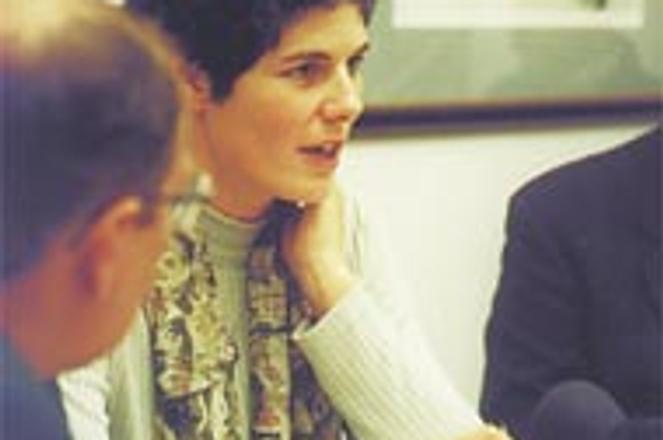UK Embassy officials Rachel Cooper and Tom Rogers lay it out.Vladimír Hák-Profit
John Skelton, an English photographer and film maker living in Slovakia, is fed up with the mutual visa restrictions imposed in October on Slovak and British citizens. "It's ridiculous," he fumed on October 15 after being forced to cancel a planned business trip to England with two Slovak colleagues.
Skelton had intended to drive to York with Adrian Kapustik and Marek Petrnák, both of Banská Bystrica in central Slovakia, but the refusal of the British embassy in Bratislava to issue travel visas to the two Slovaks meant that the October 18 trip had to be called off. Skelton said he needed the men to advise him on a new computer video-editing system.
The Home Office of the United Kingdom imposed a visa requirement on Slovak citizens travelling to the UK on October 8, a move that was parried by the Slovak cabinet with a decision to introduce a similar requirement for UK citizens as of October 15. The Home Office based its decision on a recent steep increase in Slovak immigrants to the UK seeking economic betterment.
The visa regimes threaten to hamper hundreds of Slovak and English firms like Skelton's (see related story, page 1). But embassy officials argue they are doing everything in their power to minimize the disruption caused.
Since October 8, more than 15,000 applications for entry to the UK have been processed at the British embassy in Bratislava, and according to Tom Rogers, who is in charge of the visa section, the new restrictions are a minor inconvenience to travellers, Skelton's frustrations notwithstanding. "Most people go through the first interview without any problems," Rogers said.
Rogers explained that so far not a single visa application had been refused outright, but added that a "significant number" of applicants had been asked either to withdraw their applications voluntarily, or to return in one month for a second interview. "It's an average [number for British embassies worldwide], but it's still significant ," Rogers said, adding that he could not be more specific because the embassy's "usual method of operation is not to reveal figures."
But Skelton said his colleagues had been badgered during their interview, and argued that the decision to refuse them visas had been groundless. The two men came to Bratislava on October 15, he reported, "and after they filled in the English-only application and handed over the letter from me, they were grilled by the [immigration] officer."
"They first interviewed my friend," explained Kapustik. "Once he [Petrnák] said that besides helping out with the driving, he would also like to improve his English, the officer said it was not a sufficient reason for getting a visa."
Kapustik reported that he too had been unsuccessful in convincing the officer of the innocence of his visit. "He told me I could either leave the Embassy immediately or pay an administrative fee of 2,200 Sk ($60) and come back in a month for a second interview," Kapustik said.
Rachel Cooper, the British Embassy's Deputy Head of Mission, explained that "the main reason for asking people to come back is to ensure their compliance with the [UK] Immigration Rules." She added that the criteria for obtaining a visa vary between different groups of applicants, such as students, au-pairs, businessmen and tourists.
Cooper said she was not permitted by Rules of Confidentiality to comment on Skelton's case. "I really don't think that we are in a situation to give any undertaking on any particular speculative case," she said. "You could [imagine] any number of hypothetical situations of people travelling to the UK. And we are not in the business if discussing that."
Rogers supported Cooper's stance. "I can't talk about specific cases, because we treat each case confidentially," he said. "People have to satisfy the interviewing officer with their genuiness and their reasons for travelling to the UK. If any doubts arise at the first interview, than we call people back for a second interview."


